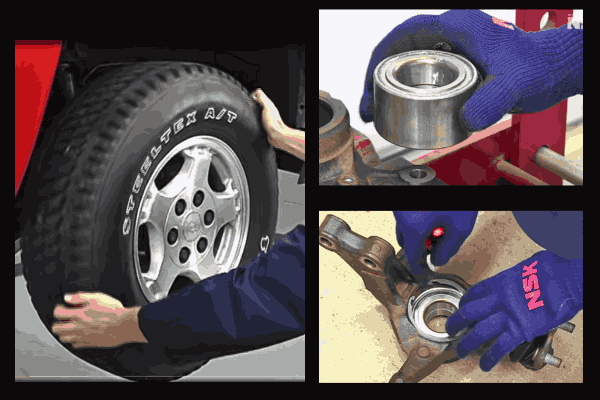In the world of Wheel Bearings, let’s discuss their importance, what might be wrong with them, and how to maintain these parts in proper condition.
In the intricate moves of your car’s components, one silent hero takes center stage: the Wheel Bearing. These unnoticed parts work in a profound manner to connect the wheel and axle such that it rotates effortlessly with little friction.
Understanding Wheel Bearings: FAQs Unveiled
Q. What Exactly is a Wheel Bearing ?
A. A Wheel Bearing is a major component of the wheel assembly; it comprises steel balls or tapers held together by a metal ring. Its main function is to allow the wheels to rotate smoothly, reducing friction between a wheel and an axle.
Q. Implications of a Failing Wheel Bearing – What are They ?
A. Loss of vehicle control, braking problems, and even the wheel coming off can occur when a Bearing of a Wheel fails. Unusual noises, uneven tire wear, vibrations in the steering wheel, and abnormal side pull along with an illuminated ABS warning light are clear indications of a poorly conditioned Bearings in a Wheel.
Q. What could be the Seriousness of Wheel Bearing Issues ?
A. A failing Bearing of a Wheel is no laughing matter. Indeed, it brings problems such as too much play in the wheel, strange noises, and uneven tire wear. The failure of Bearings in a Wheel while driving can also develop into an unmanageable dangerous situation and thus indicates the need for immediate attention.
Q. Recognizing the First Signs of Bearing Failure – How To ?
A. Excessive vibration is the first symptom of bearing failure. Then the bearing will heat up above tolerable temperatures, creating loud noises either squealing or grinding.
Q. Strategies for Prolonging Bearing Life – What are They ?
A. A proper Lubrication is the main point of preventing contaminants from getting into the bearing and protects against corrosion. So both grease and oil lubrication can be used to guarantee the highest possible bearings performance and minimize wear, given what is applied or operated.
Q. The Root Cause of Bearing Failure – What Is It ?
A. With ordinary wear and tear, a bearings failure is caused by overloading it with the load, vibration forces, or accelerated loads. The majority of this surplus force is the result of wrong installation, which demonstrates its importance in correct setup.
Don’t Get Blindsided: Essential Facts About Wheel Bearing
1. Decoding Wheel Bearing
Wheel bearings are metal rings and balls that act like the unsung heroes in your car. They lubricate, allowing the wheel to rotate smoothly and reduce friction while supporting the weight of a vehicle.
2. The Importance of A Well-Maintained Wheel Bearing
Well-functioning Bearings in a Wheel are important for the safe driving of a vehicle. They reduce problems such as excessive friction, wobbling, and overheating, thus protecting against tire damage, including accidents.
3. Warning Signs of A Wheel Bearing Trouble
Your car is talking to you when something does not feel right. The following sounds and visual or tactile clues may suggest that your Wheel Bearings need a checkup: listen for grinding, growling noises, feel if the steering vibrates rigorously, look out whether tire wears are normal, or the wearing off the rubber is in an uneven pattern; pay attention to wobbling of any sort.
4. Addressing Common Concerns – FAQs
Q. How often should I get to check my Wheel Bearings ?
A. Routine visual checks are advised, with professional ones at regular service intervals or if one suspects issues.
Q. Can I change my Wheel Bearings myself ?
A. It is possible, but replacing the bearings usually requires specific tools and skills.
Q. How much does it take to repair damaged Wheel Bearings ?
A. Price ranges from hundreds up to thousands of dollars depending on the severity of damage, vehicle model, and labor prices.
Q. Can I drive with bad Wheel Bearings ?
A. While not recommended, such driving can get progressively worse and cause accidents because of the damage that it does to the vehicle.
Q. What should I do to avoid the problems with Wheel Bearings ?
A. A proper tire pressure and smooth roads, combined with adherence to manufacturer-recommended maintenance times, can be an effective way of prolonging one’s Wheel Bearings lifespan.
Final Thoughts : Keeping the Road Smooth
While Wheel Bearings may work behind the scenes, their significance cannot be overestimated. Such measures as regular checks, timely repairs, and preventive care ensure that a car goes smoothly on the road without anything going wrong. Pay attention to the whispers of your car and make sure you have happy travels for many miles forward. Your wheels, and your mind will be grateful to you.




